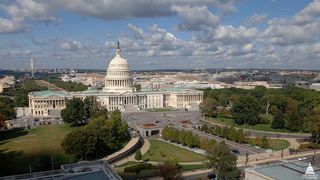McDowell: FCC Must Preempt Patchwork of 'Net Regs

The FCC should preempt state and local government efforts to regulate broadband when it votes on rolling back the Title II classification of internet access service, likely by the end of the year.
That is according to the congressional testimony of former Republican FCC commissioner Robert McDowell.
McDowell, chief public policy adviser to Mobile Future, is appearing at a hearing Wednesday (Nov. 1) on "Net Neutrality and the Role of Antitrust" in the House Subcommittee on Regulatory Reform, Commercial and Antitrust Law.
The FCC proposed in May to 1) end Title II regulation of the internet; 2) reinstate that mobile broadband is a private mobile service; 3) eliminate the general conduct standard for reviewing possible violations of open internet principles not covered under the rules; and 4) seeks comment on whether to keep, modify or eliminate bright-line rules against blocking, throttling or paid prioritization.
McDowell plans to tell the subcommittee that for the past few months, a "disturbing pattern" has emerged of state and local governments trying to regulate "many aspects" of broadband--that includes trying to recreate the broadband privacy rules Congress invalidated earlier this year.
He says the FCC needs to make it clear in its upcoming order that internet access is an interstate service to which federal rules apply. He says the FCC has ample statutory authority to do so, citing the Communications Act language "to preserve the vibrant and competitive free market that presently exists for the Internet and other interactive computer services, unfettered by Federal or State regulation."
McDowell says that antitrust and consumer protection laws enforced by Justice and the Federal Trade Commission are "more than adequate" governors on broadband company behavior and the "hypothetical harms" the FCC's current net neutrality rules targeted.
Broadcasting & Cable Newsletter
The smarter way to stay on top of broadcasting and cable industry. Sign up below
Like Republican Chairman Ajit Pai, McDowell says the FCC's 2015 Title II order has hurt innovation and investment, particularly its vague general conduct standard. He cited the "regulatory whiplash" of the FCC, under Chairman Tom Wheeler, praising free data services in one breath, and investigating them under the standard the next. Pai has since terminated that investigation.
That standard empowers the FCC to take action against practices that don't violate any bright-line rules in the order if it concludes the practices hurt consumers or edge providers, based on a multi-factor test including 1) the effect on free expression, 2) the effect on competition, innovation, investment or deployment, 3) whether the practice is application agnostic, 4) whether the end-user remains in control, 5) whether it is a standard, and 6) what technology is used, mobile or fixed.
McDowell said such "arbitrary latitude" chilled investment and product development. "[C]ompanies cannot help but be fearful to develop new services or offerings when they may be told, after the fact, that they violated a rule they could not have foreseen being applicable," he says.
Contributing editor John Eggerton has been an editor and/or writer on media regulation, legislation and policy for over four decades, including covering the FCC, FTC, Congress, the major media trade associations, and the federal courts. In addition to Multichannel News and Broadcasting + Cable, his work has appeared in Radio World, TV Technology, TV Fax, This Week in Consumer Electronics, Variety and the Encyclopedia Britannica.

